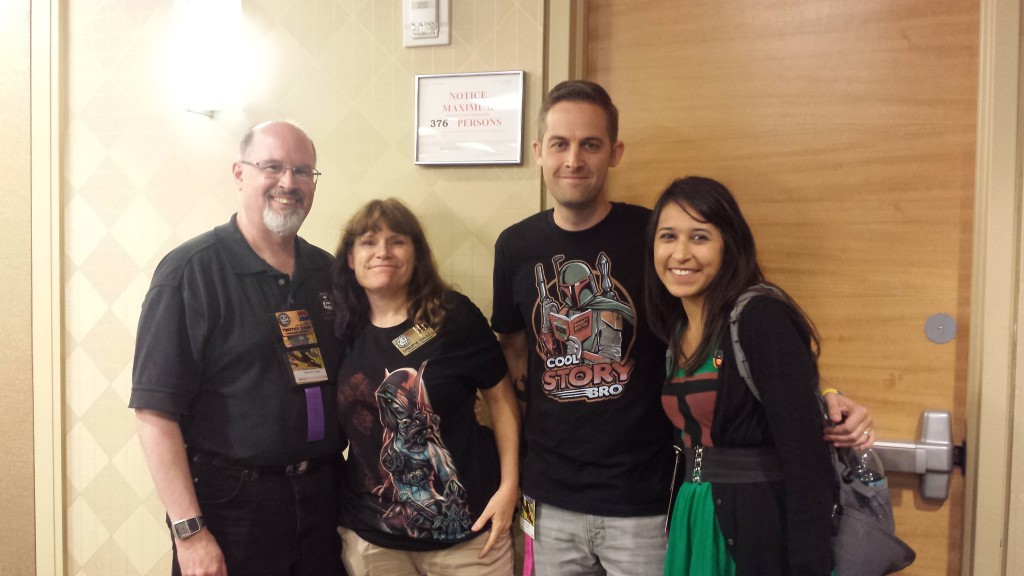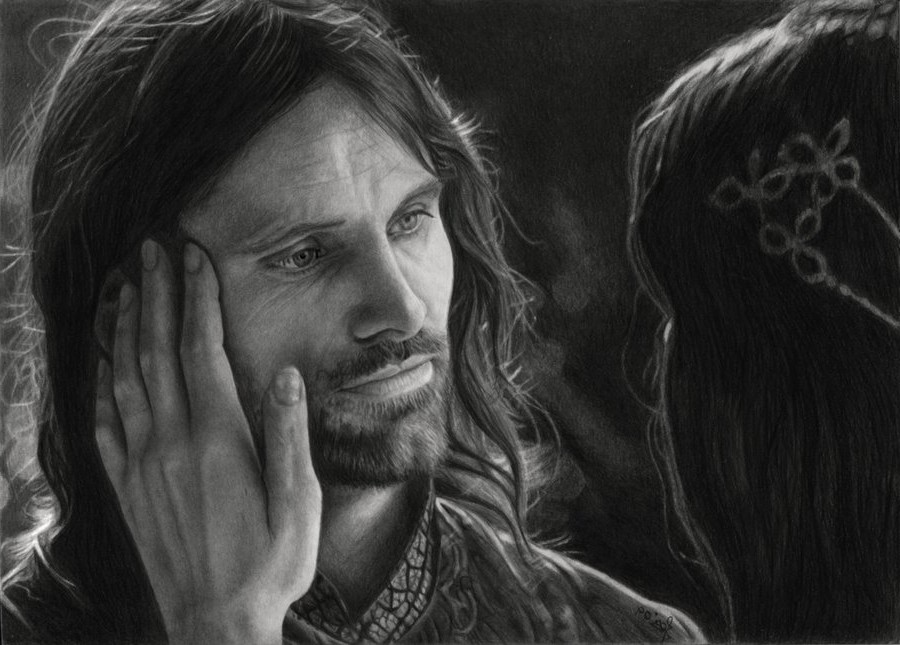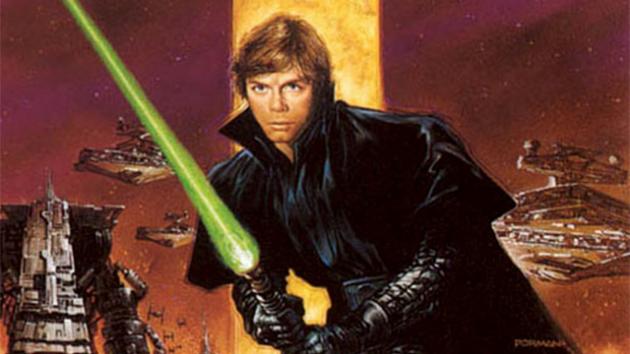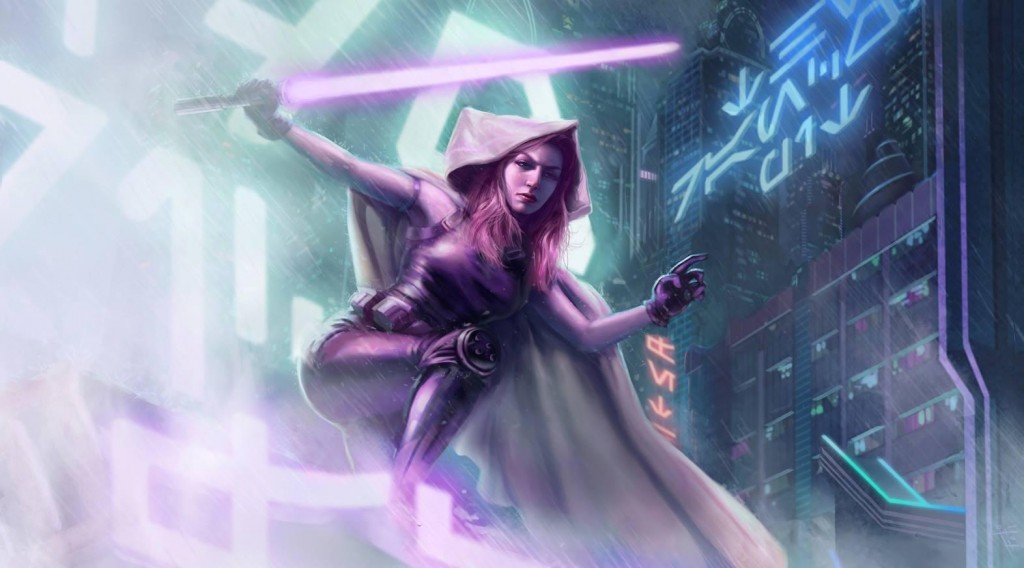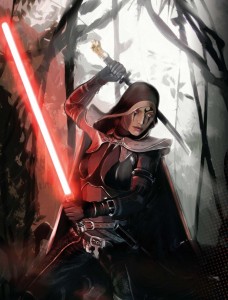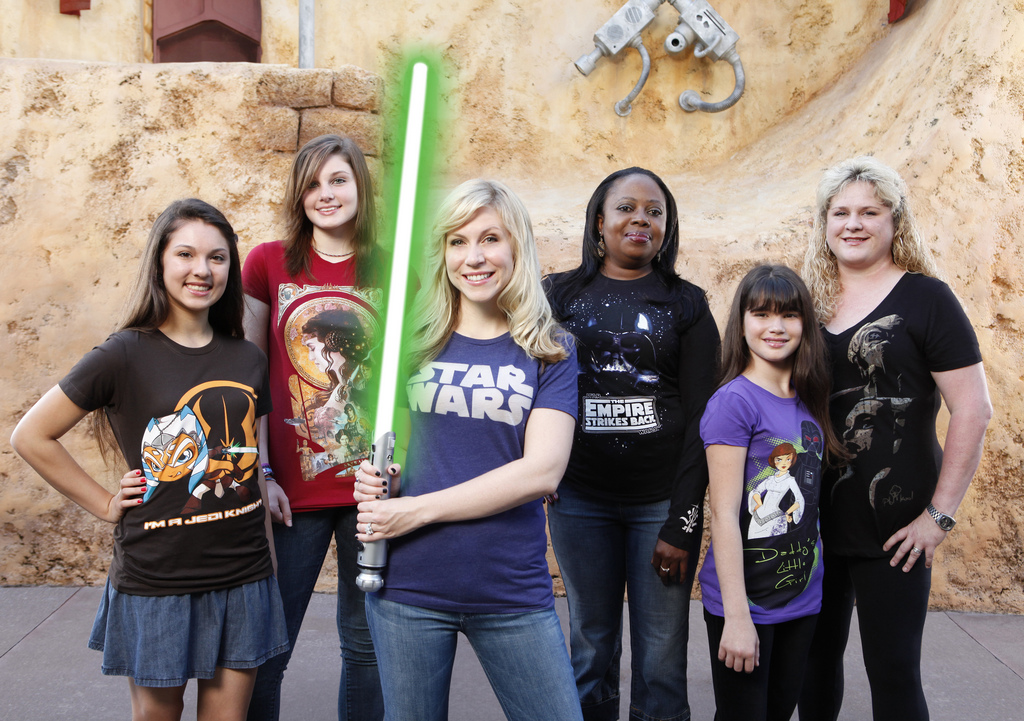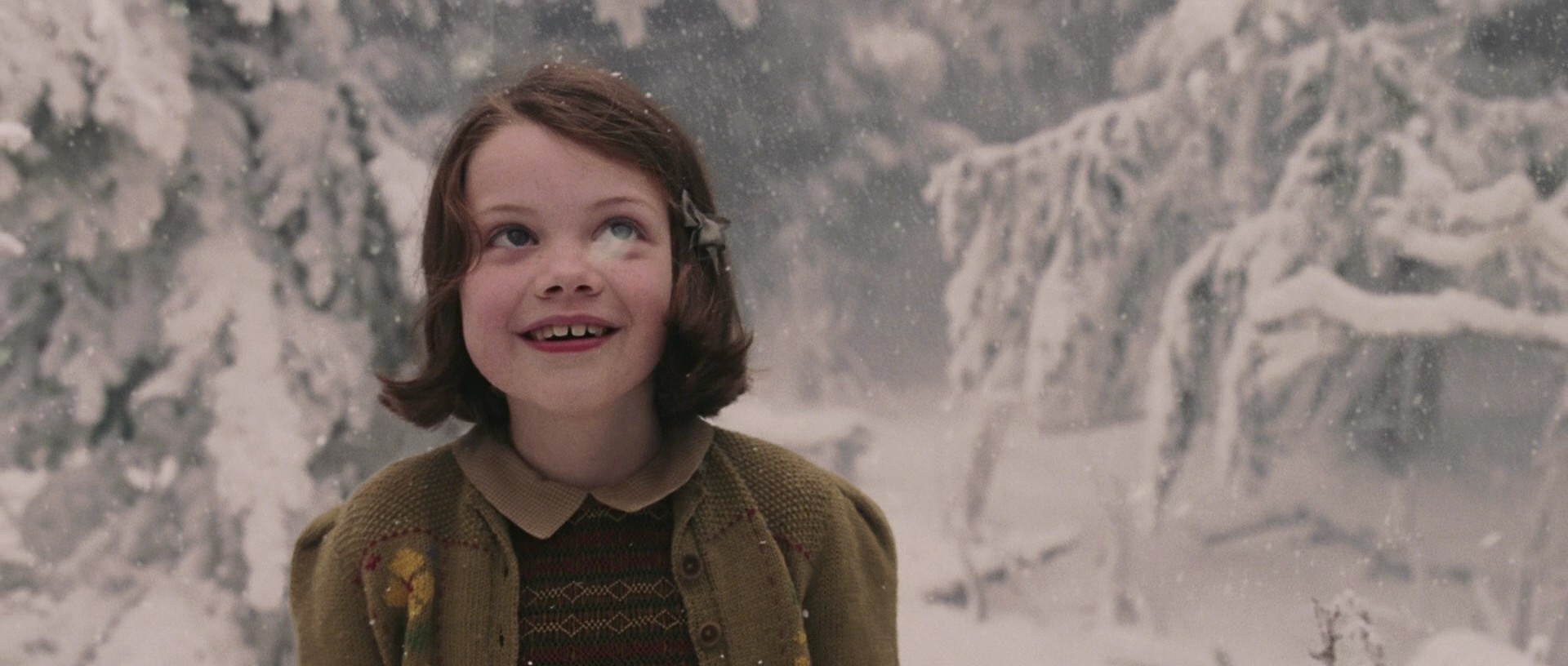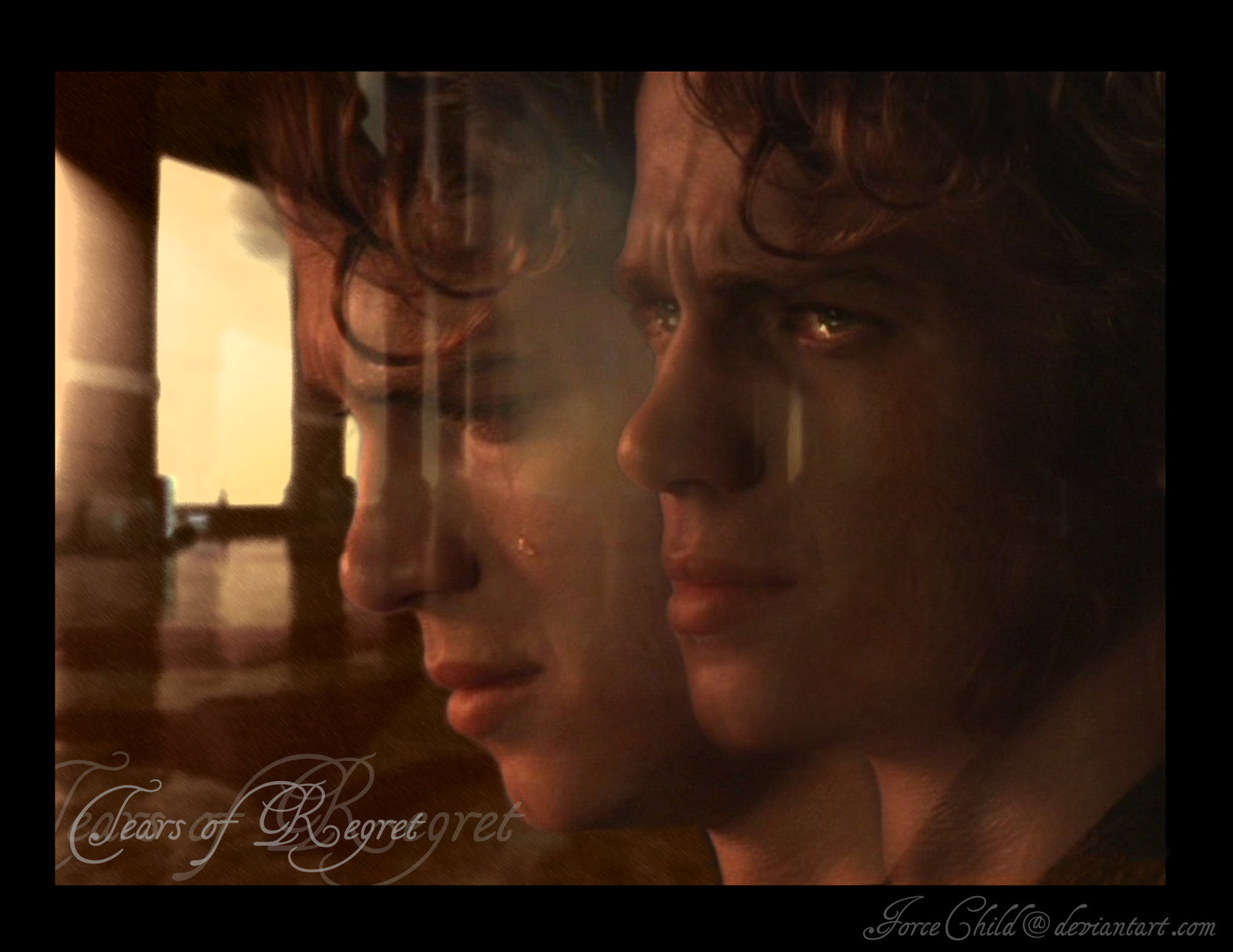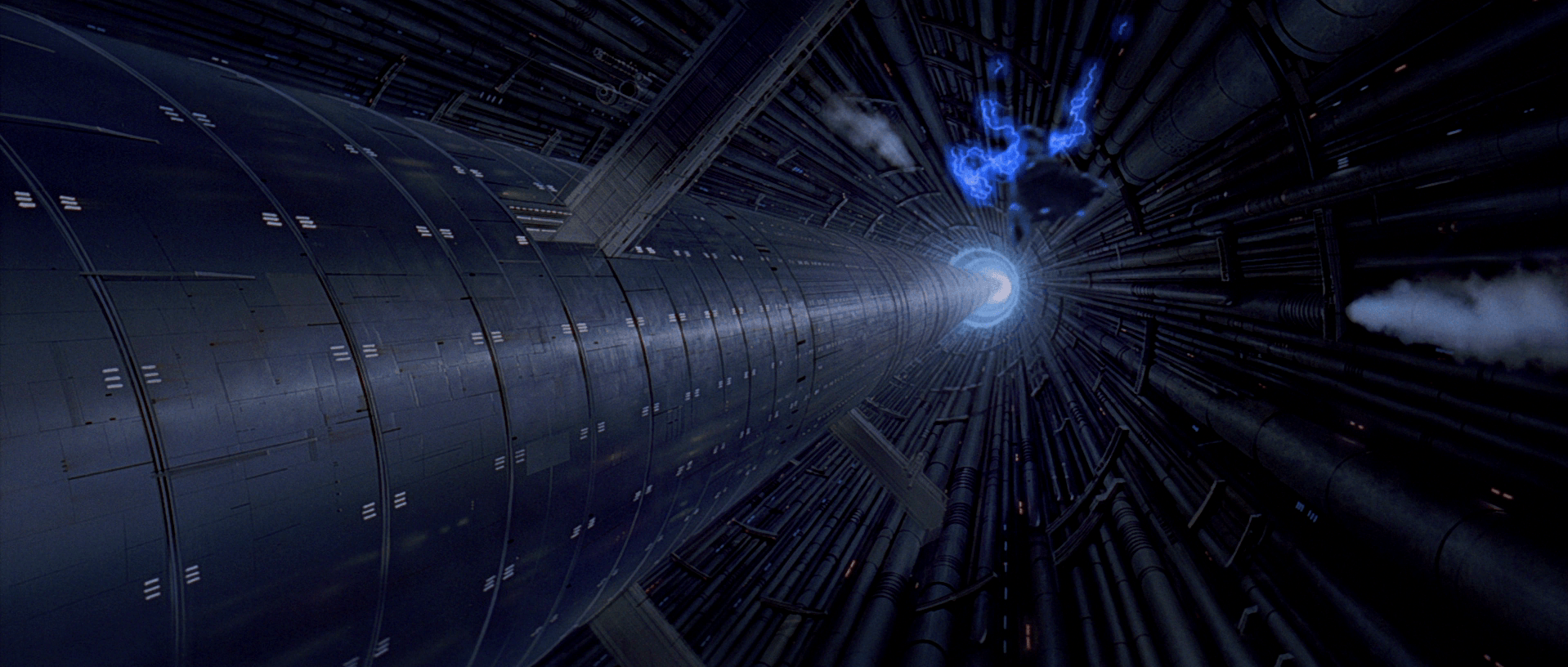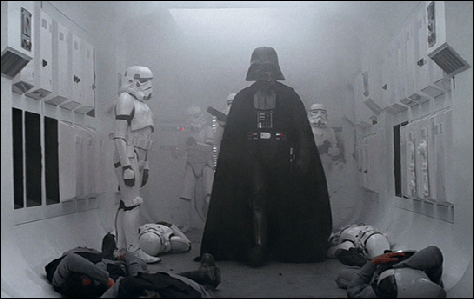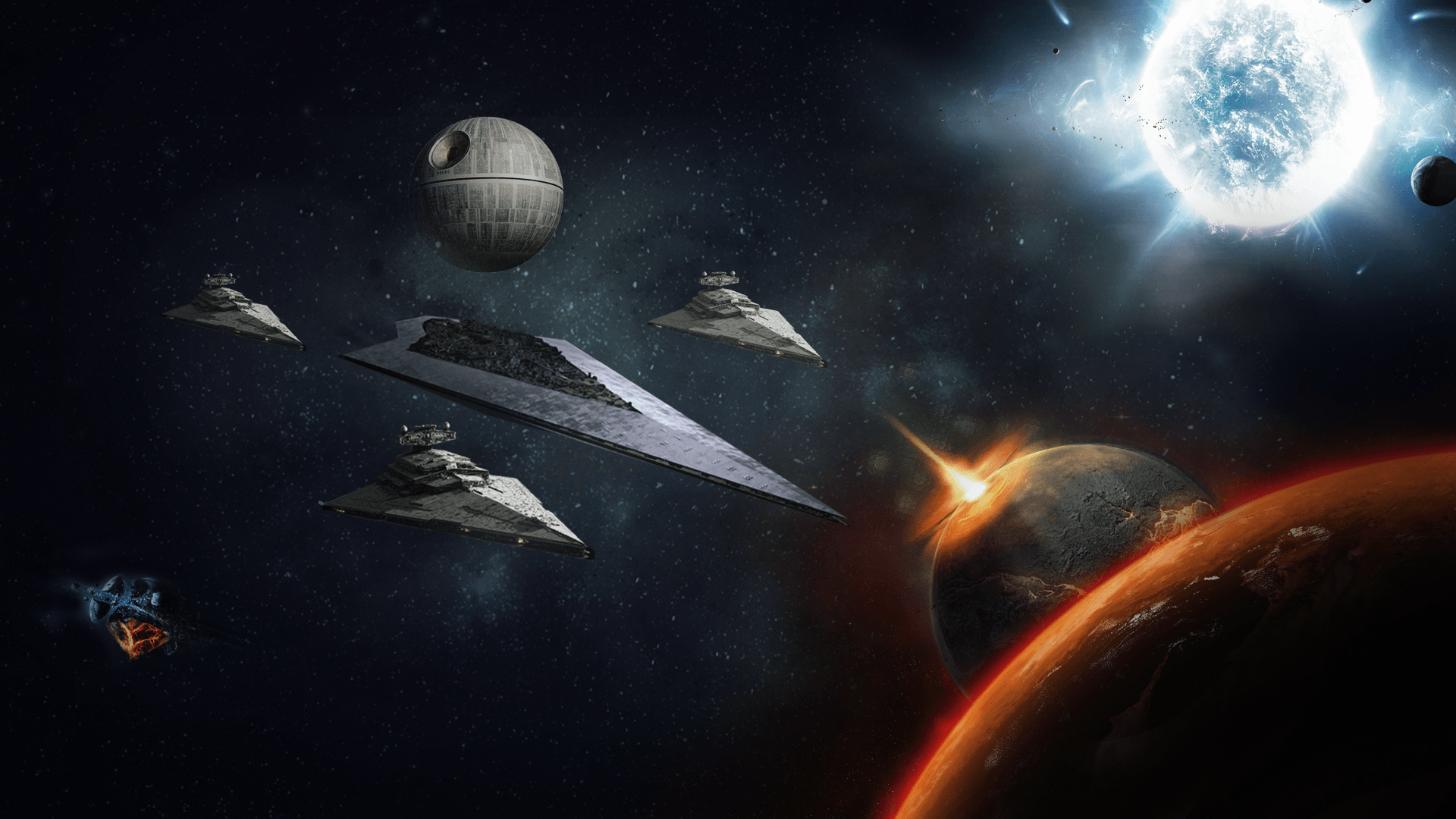This year saw me, Teresa, Riley, and Aaron all together at Dragon Con! While the convention is over, we are still releasing coverage of it including audio, photos, event coverage, and panel recaps like this one. Dragon Con has so much wonderful content from Marvel panels to parties, from Doctor Who to My Little Pony, and of course the Star Wars track, which had panels, parties, a costume contest, a trivia contest, and more. This Saturday panel was moderated by Teresa Delgado and Aaron Goins, who also have some audio of the panel on their podcast Star Wars Bookworms. The guests were Christie Golden and Timothy Zahn, both well know authors. The discussion revolved around tropes, with the authors talking about overdone story-lines in fiction, as well as classic themes that aid in the effort of telling a story well.
Disclaimer: Questions, discussion, and answers are paraphrased, as it is difficult to capture every word. That said, the panel started with a discussion of what tropes are.
Golden: Tropes are themes that resonate with us on a deeper level (or should be). I love the heroes journey, and hope as we move forward we see more of these timeless things.
Zahn: A trope adds to something, and is a good thing. When it becomes bad it’s a cliche.
At this point Golden plugged “The Writer’s Journey” book for when writers get stuck, and it uses tropes.
Zahn: Legends are what connects us, and tropes help us connect emotionally. The every-man in the audience can’t always connect with the Aragorn, but can almost always connect with the hobbits.
Golden finds two themes she seems to work a lot with: What makes good people go dark? What are the tiny steps that, by themselves, aren’t that bad, but lead to the fall of a good person? She finds that fascinating to try to understand. She also sees the triumph of the human spirit as a common one. How did humans survive the holocaust? She enjoys puzzling these out.
Zahn: There is always the option for redemption for someone.
Aaron: One common trope is the death of a mentor. Would either of you write the death of Luke Skywalker in a way like that?
Golden: You’ll see me willing to kill Luke Skywalker when you pry that lightsaber out of my cold, dead fingers. (At this point the audience broke into laughter.)
Zahn: We don’t have to follow tropes. There is no fate but what we make. I wouldn’t kill off Luke Skywalker or any of the big three, because thanks to the internet people do know where I live *laughs*. Everyone dies eventually, but you don’t have to show it. It can be off camera. Something I would like to see is a good family relationship in Episode 7. Look back at the Star Wars stories: the families are so dysfunctional because of what’s happened to them. I’d like to see a family like the one in “The Incredibles,” and good family relationships in Episode 7.
Teresa: Christie, what would you like to see in Episode 7?
Golden: I really want to see the victory on screen played out, the post “Return of the Jedi” victory that the Rebels worked so hard to get.
At this point Zahn points out Disney has a good track record with Pixar and Marvel, and that he wants to see something similar to what Golden does; he wants to see what Obi-Wan died to protect come to fruition.
Teresa: We’ve seen the rise of the fangirl, and a call for more female characters and geek products. Is there a female character you’ve really enjoyed writing?
Zahn: *jokingly* I can’t think of anyone.
Well, obviously Mara Jade, and the women in Scoundrels who are there to do their job, not as fillers or eye candy.
Golden: I like both ‘Jainas’ that I’ve written. I also liked creating Vestara Khai, and she’s interesting because of both her strengths and weaknesses. I hope we do see general things, with characters who share qualities with Mara and Jaina.
Zahn: We’re not talking about female Conan the Barbarians, we’re talking human women who stand side by side with the men, with equal strengths, weaknesses, baggage, and character.
Aaron: What tropes would you like to avoid?
Zahn: Superweapons! *audience laughs*
Golden: The “idiot plot,” which is someone in the script having to act like an idiot in order for the plot to work. Sometimes in tie-in fiction you get handed idiot plots, and then have to deal with it cleverly there. This happens more in movies than books, but I prefer to avoid it.
Audience question for Golden: What was your vision for Vestara?
Golden: I wanted to do a big book with her later on where she was basically a Joan of Ark character leading the Lost Tribe against the One Sith. It was love of her people that proved too strong for her to walk away in the end, after all.
Audience question: Were there any talks of a Darth Zannah book?
Zahn: I’m completely out of the loop, so I don’t know.
Audience question: I saw a 1980’s commercial for Star Wars underroos, which while creepy, was equal with regards to males and females in it, and was marketed equally. How has marketing changed to not having as much female representation?
Teresa: There are areas where Star Wars is marketed to female fans, and areas where it’s not. In books, and now Her Universe with clothes, it is, but in toys it isn’t marketed towards females as much.
Zahn: It does take a fair amount of money to start making an action figure, and if they aren’t convinced it’ll make money, then they don’t really want to do it. While not right, that’s the logic behind it. People like Ashley Eckstien are hopefully showing Hollywood that they can make money. People like her taking the first steps show that it works. No one wants to market Harry Potter, until it’s successful, and then everyone wants to do the next Harry Potter film.
Teresa: For clarification, the direction the toys are going now is Lucasfilm, not the direction of Disney.
Audience question: I’m a teacher, and wonder what you read as children. What are your literary influences?
Golden: I’m a big Shakespeare fan. I love “Charlotte’s Web,” Tolkien, Narnia, and “The Princess and the Goblin.”
Zahn: General science fiction. I would read everything in the library, like “Tom Swift, Jr.” Let kids read whatever they will read, and get them interested in reading. Give them something they want to keep reading.
Audience question: I’m behind, and just figured out that the Expanded Universe will become Legends. What emotions do you guys have about that, that your work has been relegated to Legends status?
Zahn: Whenever you do a contract in someone else’s universe, you know you don’t own it. You know they do whatever they choose. If you’re not comfortable with that, then you write more for yourself. The only thing for me is, if they don’t take anything from my books, and they don’t contradict anything from them, then I will consider that it really happened. *laughs* Legends are often really fun! We authors are masters of spackle and hand waving. For instance, if the new film came out, and Talon Karrde is an alien, then I’ll say that the guy I wrote as Talon Kardde was really a front man, so it really doesn’t contradict at all. *audience laughs*
Golden: These books won’t vanish from your Kindle or your shelves, and comics have been doing this for years. The characters still live on once your crack open a book.
Zahn: You can ignore Legends, but it’s still there.
Audience question: Will there be more Legends books written?
Zahn: There aren’t going to be any more Legends books, if I remember correctly, which is a shame because there are several books I’d have liked to write. But it’s conceivable that if Del Ray opened up an eBook slot, there could be annotated books. But I really think it will be in the new cannon. The short answer is no.
Audience question: There seems to be a trope in Star Wars where the good guys must have dark, terrible secrets that’s pointed out to audience. What do you guys think of that?
Golden: It’s hard to be good if you’ve done something you’re ashamed of, but hopefully people still try to be good. It tries to explain the fact that good people do bad things sometimes.
Zahn: It can be overused, but a flaw can also simply be a blind spot. Look at Marvel characters that are successful like Captain America or Thor, they have flaws, but not dark, terrible secrets. The dark secret trope can be overused.
Audience question: What is it that you think makes a great villain in sci-fi?
Zahn: Probably one opposing the good guys who is extremely competent in winning or getting towards that goal. One of my favorite villains is the character played by James Mason in “North by Northwest.” He has ice for his soul. He’s such a chilling sort of character. You can make a good, scary villain out of pretty much anybody.
Golden: I like making a villain who has a part to their character that the reader can relate to, because it’s very easy to dismiss a one dimensional character.
Audience question: What are some settings you really don’t like being given as authors?
Zahn: People doing stupid things, and thus designing things stupidly. For instance, the Emperor falling down a shaft that, for whatever reason, didn’t have a railing…. Why wouldn’t people put a railing around it?
Zahn: I don’t mind those as much, as long as they’re written well enough.
Audience question: Had you been able to write Scoundrels 2, what tropes would have been involved?
Zahn: Well it would be another “Oceans 11” type plot. There’d be someone calling on Lando for a favor owed, and Lando calling the team back together. No specific tropes, but just a team working together. However, with no one stabbing each other in the back.
Audience question: How do you think the villains will be portrayed moving forward, trope wise?
Zahn: You don’t need to go with the Darth Vader or cackling Emperor to have a villain. Villains don’t have to be visually daunting to be daunting to the audience. Everything from Hannibal Lecter and on shows you can see use of normal people to terrify an audience.
Golden: Let’s face it: Darth Vader’s entrance in “A New Hope,” I mean, wow. Such a beautiful symmetry of music, and the breathing, the fog. But, you can have villains who are very quiet and very lethal.
Audience question: How do you decide what types of worlds to build?
Golden: People reflect where they come from, and I enjoy merging people and their environments. I like to do cultural research. For instance, if we have a culture that’s very nurturing, I wonder what environment would give birth to that.
Zahn: This is what you do if it’s a major part of the book. You pick something that hasn’t really been used. Go onto Wookieepedia, pick something in the Star System you want to use, and check to see if there’s been a lot or a little written, and pick the one with the least written.
Audience question: How would you open Episode 7?
Zahn: I’d have a group of New Republic ships, and a Star Destroyer show up in front of them, but then another ship show up behind them. The Star Destroyer would then open up on the ship threatening the New Republic ships.
Golden: I’d like to start with a small group of peaceful people, but then something happens. All of a sudden a lightsaber comes out, and you find out they’re Jedi.
They continued to discuss a bit about what they’d like to see in the opening of Episode 7 if they were writing it, which I think made a good closing discussion. I appreciated how good the questions for the guests were, and the level of expertise demonstrated by the guests. Not only was the Star Wars discussion good, but I felt budding writers in the audience could get very good ideas from what was being discussed. I hope you enjoyed this panel recap, and that you’re looking forward to more classic Star Wars story telling in both the movies and new books! I know I am.

